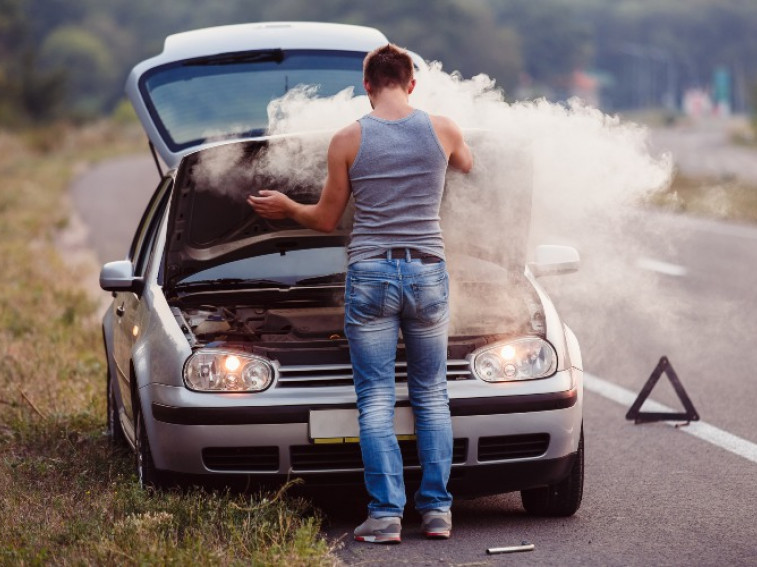No matter what their age or condition, all cars are massively complex vehicles, and that complexity means there’s almost countless things that can go wrong with them. In some of the worst case scenarios, this can leave you on the side of the road for hours waiting for rescue, and we don’t need to tell you what an absolute nightmare that is.
Thankfully, there are a couple of things you can do to reduce the risk of that happening - whether you’ve got a brand new vehicle or you’ve picked up a used one for a bargain in one of our own salvage car auctions. To help you remember them, we’ve categorised these 12 steps into two sections - the Forces, and the Basics. Here’s what’s involved!
Forces:
- Fuel
- Oil
- Rubber
- Coolant
- Electrics
- Screen wash
Basics:
- Brakes
- Air filter
- Spark plugs
- Interior must be clean
- Clean exteriors too
- See about your air conditioner
Look for disturbances in the FORCES
Engineers from the RAC attend hundreds of thousands of callouts every year all over the UK, and regularly collects data on all of them to identify any emerging patterns or trends. Having analysed these findings over the course of several years, the RAC now advises motorists to check their FORCES before setting off. That includes…
Fuel
First of all, before you leave it’s wise to check how much fuel you have available for your journey, and when you’ll next have to refuel. It might sound so simple as to be almost laughable, but you may be surprised at how many people still overlook it, or miscalculate their fuel reserves only to end up stuck at the side of the road - especially in winter weather. Most people in the UK quite rightly view running out of fuel as an entirely avoidable issue, which means that whoever comes out to rescue you probably isn’t going to be too impressed. (In certain places in other countries, like the Autobahn in Germany, it’s even illegal!)
It’s also probably worth thinking about how likely there is that you’ll have fuel pumps at your destination. If you’re going out on a day trip to the country for example, the fuel stations may well be pretty few and far between, so it bears thinking about when you’ll be able to fuel up again.
Oil
According to the RAC, its patrols check the oil levels of every car they come out to, and generally find that almost a third of them are dangerously low. We’ve explained before about why oil is so important to the running of your vehicle, whether it’s a reused salvage car or not. Basically, without oil, your engine is liable to seize up, and that can cause catastrophic damage that may well render your car a write-off. It’s a relatively quick check that can be done in seconds with a dipstick, so it’s worth making sure you do it often!

Rubber
In this context, rubber refers to two things - your tyres and your wiper blades. Tyres are obviously massively important from a safety perspective, as losing your grip on the road may mean you end up being involved in a devastating crash. Therefore, make sure to cast your eye over them regularly for general wear and tear - specifically any splits or bulges.
Check the tread depth too. The legal minimum is 1.6mm, so your tyres should always be at this depth at the very least. In winter, the official recommendation is to have tyre treads of at least 3mm. Make sure you know what the correct pressure of your tyres should be too, and check your owner’s handbook to make sure.
Your wiper blades are another element that needs attention. They wear down over time, and eventually get to a point where they need replacing. Ideally, you’ll want to discover that when your car’s parked up, not when you’re doing 60 down the dual carriageway. In the winter, they’re also known to sometimes freeze to your windscreen. If you try to activate them in this state, knowingly or not, then they can strain and damage the motors, so it’s one to check before you set off after it’s been snowy or icy. Maybe have a bucket of hot water and a sponge handy to free them, too.
Plus, there’s a neat trick to preventing this entirely - just a lay a sheet of plastic or cloth between the blades and the windscreen, and you may find that it can help you get started in the mornings just that little bit faster.
Electrics
This is a big one. There’s a lot of electrical stuff in any car, spanning from the headlights and infotainment systems to the motors in the windscreen wipers and sometimes the wing mirrors.
Before you set off, take a quick wander around the car to ensure that all lights are working, and that every visible safety element can be properly seen. That means there should be no problems with your brake lights, headlights or fog lights. It’s also a good idea to cast your eye over your number plate lights too. If your number plate isn’t clearly visible when you’re out on the roads, it can be classed as an offence!
Make sure to give your battery a quick examination from time to time as well, ensuring that all terminals are clean and tight. (You can clean off any corrosion with hot water and petroleum jelly.) Bear in mind that batteries have a useful lifespan of about four years, so after that you may want to think about getting yours replaced. They’re under particular strain in the winter - just like humans, they have to work a bit harder to keep up their output in cold conditions. The RAC estimates that it deals with about 400,000 battery faults every winter.
Obviously, the safety-critical ones are the things you need to watch out for most, but it’s worth being on the lookout for any electrical gremlins, no matter how trivial they seem. If the car it outfitted with sophisticated internal electrical systems, sometimes even the smallest of bugs can end up causing big problems. Of course, sometimes you can’t do much about those except be on the lookout for them, and report them promptly to an expert if necessary.
Screen wash
Often underestimated but still important, as it’s one of the many elements that affects visibility. Without enough screen wash on hand, you’re vulnerable to snow and grit in the winter, and bugs and pollen in the summer. In the best case scenario, an obscured windscreen might get you prosecuted for driving without due care. In the worst case scenario, you could end up driving blindly into a collision.
Thankfully, it’s easy enough to sort out. All you have to do is check the level in the tank under the bonnet, and top it up if necessary. You can pick up the necessary solution for a decent price at most petrol stations.

Get back to BASICS
We’ll admit - the Forces acronym was first used by the RAC, so we had to make our own acronym from what was left. Though we say it ourselves, we don’t think we did all that badly, although we had to be a little more creative with some of the letters. Besides the first one (brakes) these are listed in no particular order…
Brakes
We really shouldn’t need to explain how important the brakes are. Just like your tyres or your steering, they can literally make the difference between life and death, so it’s important to give them a regular once-over. While you won’t be able to do much about the brake pads themselves (unless you’ve got professional-grade knowledge and equipment), the main thing is to check that the brake fluid isn’t too low. If it is, you’ll need to top it up. It’s not a tricky job in itself, but the fluid is corrosive, so watch out for that. Your brake fluid needs to be changed at certain mileage intervals anyway - your vehicle manual will have the full details.
Air filter (in your engine)
Your engine’s air filter might not sound as critical as something like your brakes, but it can be easy to underestimate just how important it is to the overall smooth running of your car. A faulty or clogged up air filter can end up severely reducing your fuel efficiency and ultimately reducing the power of your engine - which can sometimes be a factor in breakdowns. That’s generally why most mechanics recommend getting it replaced every 12 months or 12,000 miles, whichever comes first.
Happily, it’s another one that’s not too difficult to check. It’s generally in the black box under the bonnet. You don’t need much more specialist knowledge to give it a once-over. Is it clogged with dust? If so, it could already be costing you a fair amount on fuel efficiency. If it’s not a job you’ve done before, make a note of how it fits back into its slot - working that out in advance can make the job of fitting a replacement much easier!
Spark plugs (if you’ve got a petrol engine)
Spark plugs are a very small but integral component of petrol engines. Without going into too much technical language or the intricacies of chemical reactions, the simple truth is that petrol engines are basically powered by explosions, and your spark plugs can be thought of as the matches that light the fuse. If the match doesn’t light properly, the explosion doesn’t happen, and your car doesn’t go anywhere. (Sort of lost the thread of that metaphor there.)
So if there’s a problem with your engine, spark plugs are reasonably likely culprits. To minimise the risk of breakdowns they need to be replaced every 30,000 miles or so, but you may well find you need specialised tools to do so. If you’re not a professional mechanic yourself, you can easily find out whether it’s a doable DIY job by consulting your owner’s handbook, or vehicle manual.
Interior (needs to be clean)
A nice clean car is always great, but keeping it clean and tidy is more than just a matter of pride, it’s about safety too. If a children’s toy or water bottle rolls under the brake, for instance, you may have difficulty bringing the car to a full stop, and that can obviously be extremely dangerous. A breakdown on the road is bad enough, but having an actual crash is a lot worse.
Plus, if you’ve got children you may find it’s all too easy for food to accumulate in the little nooks and crannies. Not only can that sort of stuff start to smell after enough time (especially in the summer!), but it can start to attract insects and all sorts of other undesirable critters.
Then there’s your fuel efficiency to consider. If your car is weighted down with a lot of stuff you don’t need - such as clutter in the boot - it means the engine has to work that little bit harder to haul it all around, which can impact your fuel efficiency. To avoid all that, we’d recommend having a regular tidy and clean of the interior, as well as cleaning out your footwells, wiping down your dashboard and only putting the essentials in your boot.

Clean the exterior, too
We’ve already mentioned above how your brake lights, headlights and number plates all need to be clean and free from dust and grime, to maximise your visibility while out on the roads. The entire car doesn’t necessarily have to be completely spotless, but your windows certainly need to be clean and clear, because you could end up being fined for driving a vehicle in an unsafe condition.
A reasonably common question for some drivers is: can I be prosecuted with driving with snow on my car? The truthful answer is yes, you absolutely can. We’re not suggesting you keep it completely snow-free, but if your car is covered to the point where snow is obscuring the windows, or looks like it might be, then you can indeed get prosecuted. It’s also worth clearing the snow off your roof, as this can zip off at high speeds and hit the windscreen of a car behind. It’s very scary, and very dangerous!
See if your air conditioning is working properly
Finally, temperature control is really important in your car. Again, not just for the comfort it provides all year round, but also in helping you to keep your windows free of mist so that you can see out of them properly. Unlike many of the other checks on this list though, the major difference with your air conditioning is that there’s not much the average can do about it save for a visual inspection of the pipework. To effectively handle problems with your air conditioning, it’ll require professional skills.
So that just about covers it! That’s everything you need to make sure that your car’s in top nick, ready to take out on the roads. And if you’re looking for a bargain on a second hand, used car or salvage car, that’s exactly what we can help with here at RAW2K. Our online vehicle auctions are home to a wide variety of seized cars and salvage vehicles, so if you can’t find what you’re looking for at first, you can always check back often! We’ve got makes and models from leading manufacturers like Volkswagen, Ford, and Renault, just to name a few. Why not take a look around our site, and see what you can find?




